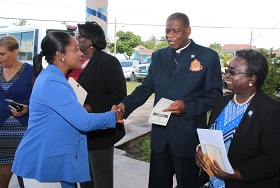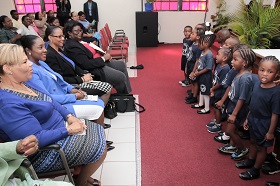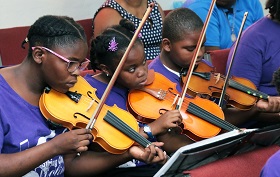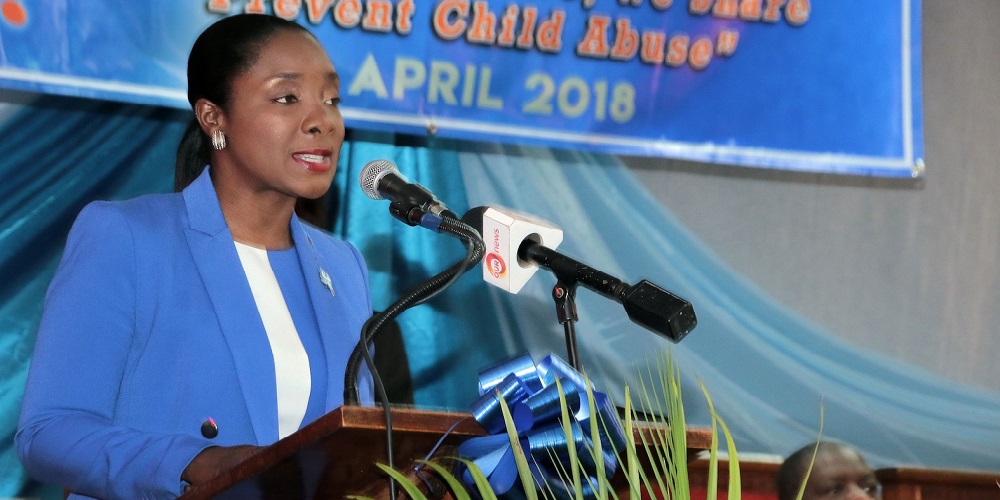 #Bahamas, May 01, 2018 – Nassau – As the Ministry of Social Services and Urban Development recognizes Child Protection Month, the Hon. Lanisha Rolle, Minister, sounded an appeal to the public to report incidents of child abuse.
#Bahamas, May 01, 2018 – Nassau – As the Ministry of Social Services and Urban Development recognizes Child Protection Month, the Hon. Lanisha Rolle, Minister, sounded an appeal to the public to report incidents of child abuse.
“We should all be self-proclaimed advocates. We have all stood in the place that our children now stand and we were likewise dependent. There is no excuse to turn a blind eye to what is, or appears to be abuse of a child. One child abused is one child too many. If we see it, we ought to say it and if we hear it we have a duty to tell it,” said Minister Rolle.
She addressed a church service at Commonwealth Baptist Church, Elizabeth Estates, in observance of Child Protection Month, Thursday, April 26. The service was organized by the Ministry in conjunction with the National Child Protection Council and the Suspected Child Abuse Neglect Unit. The theme for the month is ‘We Care. We Share – Prevent Child Abuse’. It was attended by Cora Bain-Colebrooke, acting permanent secretary; acting director, Lillian Quant-Forbes, senior government officials, representatives of the Scans Unit, Child Protection Council and school students.
Minister Rolle said children are susceptible to emotional abuse, physical abuse, sexual abuse through assault, molestation, incest and rape, and all too commonly suffer from neglect both physically and emotionally.
She affirmed the Ministry’s commitment to doing all within its power to ensure the government allocates the resources necessary to protect the rights of every child and to preventing, detecting, eliminating and eradicating “all” forms of abuse against children.

“Abuse in any form is unacceptable. Child mistreatment, sexual abuse of children with disabilities, incest, child pornography, child labour, child prostitution, child neglect and abandonment are all offences recognized under the law, and I am committed to strengthening our Investigations arm of Child Protection Services to identify and initiate the prosecution of such offenders to the fullest extent of the law.”
She said in addition to community programs sponsored by Social Services, the Urban Development programs run by the Government and partnering stakeholders, church programs and other reputable organizations create the environment necessary for the protection and sustainable  development of children and the country’ social fabric.
development of children and the country’ social fabric.
Minister Rolle reported that child neglect is the most common form of abuse and accounts for 40 per cent of reported abuse cases in The Bahamas.
“Under section 31 of the Child Protection Act (CPA) parents and guardians have a duty to maintain their children.
“It is our duty as parents, advocates, community partners, government and a society to ensure the future of our children is safe and secure through the protection of our children and their rights – the right to life, the right to protection of property, protection from forced labour and unlawful detention, protection from arbitrary arrest, from violence and unlawful abuse and protection from unlawful arrest are fundamental rights and freedoms for the individual under the constitution.
“Our children deserve equal protection under the law. We care, we share. We must enforce the law to prevent and respond to child abuse.”

Minister Rolle admonished parents and guardians not to allow children on the Family Islands, in the urban and suburban communities to “suffer” in silence. She said according to section 63 of the CPA every individual has a duty to report child suffering.
“An adult engaging in relationships with a child under 18, a minor under the law and whose mind and thought processes are not fully mature, is engaging in child abuse. Such acts of selfish adults must be reported as these instances destroy the lives of girls and boys. Adults should date adults.
“Children are depending on us to ensure they are educated. Under section 2007 of the CPA, every child has a right to education. A parent or guardian cannot decide without good reason to keep their child away from school and deny the child an opportunity to learn.
“Parents and guardians do not have the right to use children to pay their bills or beg alms on their behalf. Where we find this occurring the Department of Social Services, under section 30 of the CPA, has a duty to safeguard and promote the welfare of children and to mediate in any situation where the rights of a child are infringed. According to section 80 of the CPA, the state has a duty to investigate and initiate prosecution of those who violate the rights of the child,” said Minister Rolle.
In his sermon, Bishop Arnold Josey, Pastor of Commonwealth Baptist Church and Chairman of the National Child Protection Council, said the  nation has a responsibility to ensure that everyone, inclusive of children, live and thrive in a safe, stable, nurturing environment for all.
nation has a responsibility to ensure that everyone, inclusive of children, live and thrive in a safe, stable, nurturing environment for all.
“The reality is, in the midst of it all we have mounting adverse childhood experiences that we must tackle,” he said.
“The mental and physical struggles of our children are multiple and multi-faceted. We need to get back to being a caring and concerned people.”
The church service is one of the activities of Child Protection Month. Other activities included a Fun Day for children and a Poetry Competition, which was won by Michaella Lockhart.
By Kathryn Campbell
PHOTO CAPTIONS
1686
The Hon. Lanisha Rolle, Minister of Social Services and Urban Development greets Bishop Arnold Josey, Chairman of the National Child Protection Council.
1703
From left to right: Lillian Quant Forbes, acting director; the Hon. Lanisha Rolle, Minister of Social Services and Urban Development; Cora Bain Colebrooke, acting permanent secretary and Charlamae Fernander, assistant director.
1731
The Hon. Lanisha Rolle addresses the Child Protection Month Church Service.
1715
The String City Violinists perform a musical selection.

